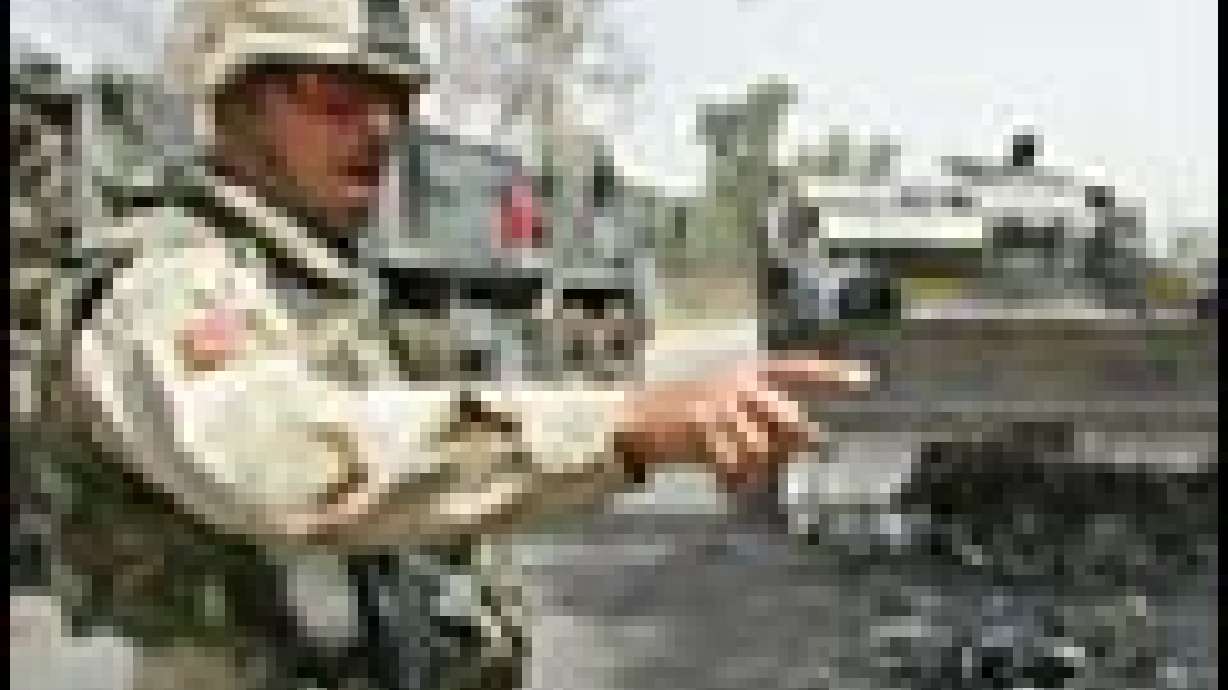Estimated read time: 4-5 minutes
This archived news story is available only for your personal, non-commercial use. Information in the story may be outdated or superseded by additional information. Reading or replaying the story in its archived form does not constitute a republication of the story.
BAGHDAD, Iraq (AP) -- A powerful car bomb exploded outside the Jordanian Embassy on Thursday, hurling vehicles in the air and killing at least 11 people, including a woman and two children, morgue officials said. More than 50 people were wounded in the blast.
Later Thursday, a fierce gunbattle broke out in central Baghdad, wounding at least two U.S. soldiers. The violence followed a firefight the night before in which two American soldiers were killed, the military announced.
The deaths Wednesday night ended a four-day period in which no U.S. forces had been killed and brought to 55 the number of U.S. troops killed in combat since May 1, when President Bush declared major fighting over. The two were killed in a battle in the Al Rashid section of Baghdad, and their translator was wounded, the U.S. Central Command said.
Thursday's gunbattle erupted when a U.S. Humvee was attacked by rocket-propelled grenades, wounding two soldiers and destroying the vehicle, witnesses said.
The Americans responded with an assault on the source of the fire, a nearby two-story building, trading machine gun and automatic rifle fire with those inside. At least at 20 Humvees and eight Bradley fighting vehicles joined the counterattack, while three helicopters hovered overhead.
The military allowed about 20 civilians inside to come out with their hands in the air, some carrying white handkerchiefs. U.S. forces then stormed the building and emerged about five minutes later carrying a soldier, who was evacuated from the firezone. It was not known if the soldier was killed or wounded.
After the soldiers attacked, the building began burning and was gutted.
Elsewhere, U.S. forces captured four suspected leaders of the anti-U.S. resistance in pre-dawn raids Thursday, the military said, a day after the Americans netted 18 suspected Saddam Hussein loyalists and found a huge stockpile of weapons.
Lt. Gen. Ricardo Sanchez, commander of U.S. ground forces in Iraq, called the bombing of the Jordanian Embassy a "terrorist" attack and said it was "the worst on a soft target" since Baghdad fell to American forces April 9.
The blast blew down one wall of the embassy and gutted nearby cars, hurling the mangled remains of one onto the roof of a nearby building. Two bodies were seen still sitting in some of the vehicles damaged in the blast.
Shortly after the blast, young Iraqi men stormed the embassy gate and began destroying pictures of Jordanian King Abdullah II and his late father, King Hussein. They were shouting anti-Jordanian chants, but were quickly dispersed by American forces and Iraqi police.
The bomb was believed to have been planted in a minibus parked outside the walled embassy compound and detonated remotely. The chassis of the minibus landed on top of three of the burned out cars.
At least four Iraqi policemen were among the dead, said police Sgt. Hakmat Ibrahim Obidi, who was injured. Sanchez said eight people were confirmed dead, but morgue officials put the death toll at 11. Hospital officials said at least six Jordanians were wounded, including the consul, Karim Shushan.
"I was sitting in the reception. I heard the first explosion, I ran out and then there was another explosion. Many employees were inside the embassy as well as Iraqis and Jordanians. Smoke filled the street," said Shaheed Mazloum, 50, an Iraqi guard at the embassy, who was treated at the al-Kharkh Hospital.
In Jordan, Information Minister Nabil al-Sharif condemned the "cowardly terrorist attack."
"This criminal act will only boost our determination to continue our support for the brotherly Iraqi people," he said.
Tensions between the neighboring countries have been high because of Jordan's support for the U.S.-led war on Iraq.
While Jordan is a major entry point into Iraq and remains a large trading partner, many Iraqis are resentful that Jordan dropped its support for Saddam Hussein after the 1991 Gulf War, and allowed U.S. troops to use its soil as a base during the latest war.
King Abdullah II last week granted "humanitarian asylum" to two daughters of Saddam, whose husbands fled to Jordan in 1996 but were lured back home and killed by Saddam's regime in 1996.
In Saddam's hometown of Tikrit, the U.S. military said one of the four Iraqis captured Thursday allegedly organized cells and paid and armed guerrilla fighters for attacks on U.S. forces in the town.
Also among the captured were two former Iraqi generals suspected of organizing guerrilla attacks nationwide and a suspected Fedayeen militia ringleader, said Lt. Col. Steve Russell of the 4th Infantry Division, which carried out the raids.
Russell declined to name any of them, but said one of the leaders was known as "The Rock."
In one of the raids, about 100 soldiers backed by four battle tanks surrounded a hotel while Apache attack helicopters circled overhead and
The troops brought 39 men out of the hotel and some neighboring buildings, releasing all but one after questioning them.
"If you fight against your government, we will hunt you down and kill you," Russell told the freed men through an interpreter.
(Copyright 2003 by The Associated Press. All Rights Reserved.)









